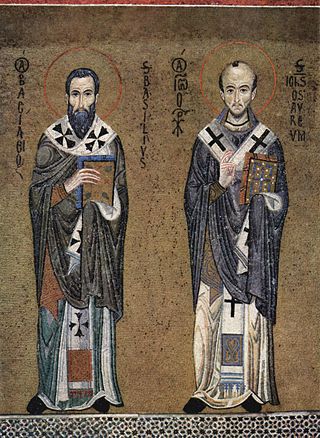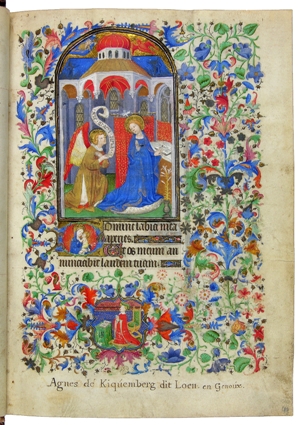Related Research Articles

Vespers is a liturgy of evening prayer, one of the canonical hours in Catholic, Eastern Orthodox, Oriental Orthodox, and Lutheran liturgies. The word for this fixed prayer time comes from the Latin vesper, meaning "evening".
A doxology is a short hymn of praises to God in various forms of Christian worship, often added to the end of canticles, psalms, and hymns. The tradition derives from a similar practice in the Jewish synagogue, where some version of the Kaddish serves to terminate each section of the service.

Divine Liturgy or Holy Liturgy is the Eucharistic service of the Byzantine Rite, developed from the Antiochene Rite of Christian liturgy which is that of the Ecumenical Patriarchate of Constantinople. As such, it is used in the Eastern Orthodox, the Greek Catholic Churches, and the Ukrainian Lutheran Church. Although the same term is sometimes applied in English to the Eucharistic service of Armenian Christians, both of the Armenian Apostolic Church and of the Armenian Catholic Church, they use in their own language a term meaning "holy offering" or "holy sacrifice". Other churches also treat "Divine Liturgy" simply as one of many names that can be used, but it is not their normal term.

In the practice of Christianity, canonical hours mark the divisions of the day in terms of fixed times of prayer at regular intervals. A book of hours, chiefly a breviary, normally contains a version of, or selection from, such prayers.
A canticle is a hymn, psalm or other Christian song of praise with lyrics usually taken from biblical or holy texts. Canticles are used in Christian liturgy.

Holy Saturday, also known as Great and Holy Saturday, the Great Sabbath, Hallelujah Saturday, Saturday of the Glory, Sabado de Gloria, and Black Saturday or Easter Eve, and called "Joyous Saturday", "the Saturday of Light", and "Mega Sabbatun" among Coptic Christians, is the final day of Holy Week, between Good Friday and Easter Sunday, when Christians prepare for the latter.

Compline, also known as Complin, Night Prayer, or the Prayers at the End of the Day, is the final prayer liturgy of the day in the Christian tradition of canonical hours, which are prayed at fixed prayer times.
Matins is a canonical hour in Christian liturgy, originally sung during the darkness of early morning.
Easter Vigil, also called the Paschal Vigil or the Great Vigil of Easter, is a liturgy held in traditional Christian churches as the first official celebration of the Resurrection of Jesus. Historically, it is during this liturgy that people are baptized and that adult catechumens are received into full communion with the Church. It is held in the hours of darkness between sunset on Holy Saturday and sunrise on Easter Day – most commonly in the evening of Holy Saturday or midnight – and is the first celebration of Easter, days traditionally being considered to begin at sunset.

The Liturgy of the Hours or Divine Office or Opus Dei are a set of Catholic prayers comprising the canonical hours, often also referred to as the breviary, of the Latin Church. The Liturgy of the Hours forms the official set of prayers "marking the hours of each day and sanctifying the day with prayer." The term "Liturgy of the Hours" has been retroactively applied to the practices of saying the canonical hours in both the Christian East and West–particularly within the Latin liturgical rites–prior to the Second Vatican Council, and is the official term for the canonical hours promulgated for usage by the Latin Church in 1971. Before 1971, the official form for the Latin Church was the Breviarium Romanum, first published in 1568 with major editions through 1962.
Orthros or Útrenya, in the Byzantine Rite of the Eastern Orthodox Church and the Eastern Catholic Churches, is the last of the four night offices, the other three being vespers, compline, and midnight office. Traditionally, in monasteries it is held daily so as to end immediately following sunrise, in contrast to parishes where it is held only on Sundays and feast days. It is often called matins after the office it most nearly corresponds to in Western Christian churches.

Psalm 103 is the 103rd psalm of the Book of Psalms, beginning in English in the King James Version: "Bless the LORD, O my soul". The Book of Psalms is part of the third section of the Hebrew Bible, and a book of the Christian Old Testament. In Latin, it is known as "Benedic anima mea Domino". The psalm is a hymn psalm.
Prime, or the First Hour, is one of the canonical hours of the Divine Office, said at the first hour of daylight, between the dawn hour of Lauds and the 9 a.m. hour of Terce. It remains part of the Christian liturgies of Eastern Christianity, but suppressed within the Latin liturgical rites by the Second Vatican Council. In the Coptic Church, a denomination of Oriental Orthodox Christianity, the office of Prime is prayed at 6 am in eastward direction of prayer by all members in this denomination, both clergy and laity, being one of the seven fixed prayer times. Latin Catholic clergy under obligation to celebrate the Liturgy of the Hours may still fulfil their obligation by using the edition of the Roman Breviary promulgated by Pope John XXIII in 1962, which contains Prime. Like all the liturgical hours, except the Office of Readings, it consists mainly of Psalms. It is one of the Little Hours.
Nones, also known as None, the Ninth Hour, or the Midafternoon Prayer, is a fixed time of prayer of the Divine Office of almost all the traditional Christian liturgies. It consists mainly of psalms and is said around 3 pm, about the ninth hour after dawn.
Acolouthia in the Eastern Orthodox and Eastern Catholic churches, signifies the arrangement of the Divine Services, perhaps because the parts are closely connected and follow in order. In a more restricted sense, the term "acolouth" refers to the fixed portion of the Office. The portions of the Office that are variable are called the Sequences. While the structure and history of the various forms of the Divine Office in the numerous ancient Christian rites is exceedingly rich, the following article will restrict itself to the practice as it evolved in the Eastern Roman (Byzantine) Empire.

The Midnight Office is one of the Canonical Hours that compose the cycle of daily worship in the Byzantine Rite. The office originated as a purely monastic devotion inspired by Psalm 118:62, At midnight I arose to give thanks unto Thee for the judgments of Thy righteousness (LXX), and also by the Gospel Parable of the Wise and Foolish Virgins.
Eastern Orthodox worship in this article is distinguished from Eastern Orthodox prayer in that 'worship' refers to the activity of the Christian Church as a body offering up prayers to God while 'prayer' refers to the individual devotional traditions of the Orthodox.

Psalm 147 is the 147th psalm of the Book of Psalms, beginning in English in the King James Version, "Praise ye the LORD: for it is good to sing praises". In the slightly different numbering system used in the Greek Septuagint version of the Bible, and in the Latin Vulgate/Vulgata Clementina, this psalm is divided into Psalm 146 and Psalm 147. In Latin, Psalm 146 is known as "Laudate Dominum quoniam bonum psalmus", and Psalm 147 as "Lauda Jerusalem Dominum".

Psalm 136 is the 136th psalm of the Book of Psalms, beginning in English in the King James Version: "O give thanks unto the LORD; for he is good: for his mercy endureth for ever. ". The Book of Psalms is part of the third section of the Hebrew Bible, and a book of the Christian Old Testament. In the slightly different numbering system used in the Greek Septuagint and Latin Vulgate translations of the Bible, this psalm is Psalm 135. In Latin, it is known by the incipit, "Confitemini Domino quoniam bonus". It is sometimes referred to as "The Great Hallel". The Jerusalem Bible calls it a "Litany of Thanksgiving". It is notable for the refrain which forms the second half of each verse, translated as "For His mercy endures forever" in the New King James Version, or "for his steadfast love endures for ever" in the Revised Standard Version.

Psalm 47 is the 47th psalm of the Book of Psalms, beginning in English in the King James Version: "O clap your hands". The Book of Psalms is the third section of the Hebrew Bible, and a book of the Christian Old Testament. In the slightly different numbering system used in the Greek Septuagint and Latin Vulgate translations of the Bible, this psalm is Psalm 46. In Latin, it is known as "Omnes gentes plaudite manibus". The psalm is a hymn psalm. It is one of twelve psalms attributed to the sons of Korah, and one of fifty-five psalms addressed to the "Chief Musician" or "Conductor".
References
- ↑ Outline of Tasbeha Archived 2011-09-27 at the Wayback Machine
- ↑ Praises Explained
- ↑ In many Protestant versions of the Bible, this is found separately in the Apocrypha.
- ↑ Arrangement of the Holy Psalmody
- ↑ Facebook group referring to Tasbeha as Heaven on Earth
- ↑ Explanation of Praises